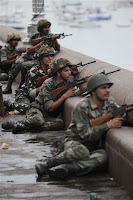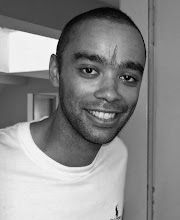This terrorist attack on Mumbai made me wondering certain tings. I wrote in my previous blog that the eyes of one of those terrorists made me wonder the most. And the fact how precious, yet fragile the life is. My wondering can end instantaneously literally in each and every moment. And I should be thankful for every new day I get -and every old one I've got, for that matter. :)
 Watching into the eyes of that young murderer, I think I realised something that might sounds provoking. Please do not take me wrong, that is not my intention! We are humans. The greatest among us, like Krishna, Zarathustra, Lao Ce, Buddha, Jesus, Muhammad, did not (want to? could not?) change the world, but kept the spark alive. We are an inevitable mixture of 'good' and 'bad'. Look the thousands of years of human history -it seems like the very same movie is being played in different costumes; look at the billions of years of history of animal kingdom; and last but not least look at the realm of the physical universe. There are and will always be forces against other forces in every level; there are always some who kill, and some being killed, in both symbolic and actual means. The dance of these forces writes the story of our world. Think of the ancient Chinese symbol of Yin and Yang. Without the dance of 'good' and 'bad', of the opposing forces, the story stops being told. In the physical world, as well as in the human realm - after all, the reality is one, even though it takes various forms. Every day, when you just spend a homey family dinner with the ones whom you love, you kill - to sustain your body. Our immune system kills millions of other living creatures just to keep us alive; to participate in the existence of this universe, we ought to kill, we ought to suppress other forces to give way to those we label as ours.
Watching into the eyes of that young murderer, I think I realised something that might sounds provoking. Please do not take me wrong, that is not my intention! We are humans. The greatest among us, like Krishna, Zarathustra, Lao Ce, Buddha, Jesus, Muhammad, did not (want to? could not?) change the world, but kept the spark alive. We are an inevitable mixture of 'good' and 'bad'. Look the thousands of years of human history -it seems like the very same movie is being played in different costumes; look at the billions of years of history of animal kingdom; and last but not least look at the realm of the physical universe. There are and will always be forces against other forces in every level; there are always some who kill, and some being killed, in both symbolic and actual means. The dance of these forces writes the story of our world. Think of the ancient Chinese symbol of Yin and Yang. Without the dance of 'good' and 'bad', of the opposing forces, the story stops being told. In the physical world, as well as in the human realm - after all, the reality is one, even though it takes various forms. Every day, when you just spend a homey family dinner with the ones whom you love, you kill - to sustain your body. Our immune system kills millions of other living creatures just to keep us alive; to participate in the existence of this universe, we ought to kill, we ought to suppress other forces to give way to those we label as ours.
Of course, most of us do not shoot harmless people when walking on the streets, and one certainly feels some distinction here. We have a certain barrier, beyond which we stop hurting others. But - Until what..? Frankly, how many times in your personal life have you hurt someone gravely? Maybe someone whom you claimed to love... How many times you felt so deep anger that you would have liked to hit the opponent, or even did hit him for that matter; or felt to clear him out of your way at once. Surely, you did not do it in the end. There was that barrier.
But where that barrier comes from? From education, from fear of consequences. For how many of us it comes from inside, out of true love; true acceptance of the other being, of the other opinion in that certain moment..? No, if it arisen out of love not conditioning, the anger would not even be born. Because then you, we would realize how unimportant all such arguments are. That we have come to this world together naked, and one day, soon or later, we all leave alike. Until that we are bound. We create the external reality of one and other. And, after all, nothing has any importance what so ever, except what world we create to others, who and what (!) share this existence, at this time with us.
Be honest: what reality do you offer to your fellow beings? To your beloved ones, to the ones whom you dislike, and to that poor animal whose skin was used to make your shoes or belt, or your medicine was experimented on. Is your attitude, the way you look others, is it really utterly pure, compassionate, selfless, uplifting, filled with unconditional love -as you think the world should be? At least mine is not. Neither of those young terrorists.
Clearly, they did not have that barrier we others do, or put it to an other perspective: their barriers lied much further out than that of the mass of people. The barrier, until they are ready to hurt. They might have had different conditioning (surely); They might have had more rough experiences that taught them something different; They might have been taught, trained to overcome their fear, compassion and let those negative forces to burst out of them into the physical world, and eradicate other human beings from existence.
Apart this, I do not see much qualitative difference between them and me. And you? Were you be much different from them if you were trained by your parents, by your adult idols, by all whom you admired to kill for higher good since your childhood? Were you, really..? Do not you really have a dark side that could have been conditioned by people and circumstances to be more apparent -far more apparent? Are you really strong enough, and good enough that whatever circumstances you were put as a baby, the outcome certainly would be someone we call a good man? So, that is what I mean...
There might be purely evil man on this globe, but I have never seen or heard or red about any single one, whom I could say about: s/he is the evil in human form. On the contrary, what I saw, red and heard is that circumstances could turn quite ordinary people into evil (I could refer here from handful psychological experiments to the Holocaust, but I'd rather not to). This tells me, that all the troubles lay within us, ordinary, everyday people. Deep down, hidden. Hidden, suppressed in me, in you, and apparent in some others.
...
The other day some of us were discussing things with a Buddhist monk. One lady expressed her sorrow by the terror one can find in this world; the wars, diseases, sufferings, tears, the pains that one causes to another. The monk said:
-We belong to here. Were we pure, we would live in heaven. Something that is made of the qualities of a different realm, is bound to be present there, not here. But we are part of this realm. We have been growing into this universe, from these very conditions. The soil, the water, the sun ray that made our very beings to grow into existence, are made of anger, envy, hatred, compassion, love, joy, hopes and fears. This is the human challenge. 'Good' and 'bad' are both the building materials of each and every one of us and we have to accept that we are organic part of this universe, with every single cells of ours.
There is no a separated good and innocent self, and the bad world out there; The universe is manifested in our beings, therefore we inherently carry all of its gifts and burdens within our fabrics - our very existence in this world is the prove that we belong to all of its sufferings, whether we cause or bear them.
* Photo from: http://timesofindia.indiatimes.com:
 Watching into the eyes of that young murderer, I think I realised something that might sounds provoking. Please do not take me wrong, that is not my intention! We are humans. The greatest among us, like Krishna, Zarathustra, Lao Ce, Buddha, Jesus, Muhammad, did not (want to? could not?) change the world, but kept the spark alive. We are an inevitable mixture of 'good' and 'bad'. Look the thousands of years of human history -it seems like the very same movie is being played in different costumes; look at the billions of years of history of animal kingdom; and last but not least look at the realm of the physical universe. There are and will always be forces against other forces in every level; there are always some who kill, and some being killed, in both symbolic and actual means. The dance of these forces writes the story of our world. Think of the ancient Chinese symbol of Yin and Yang. Without the dance of 'good' and 'bad', of the opposing forces, the story stops being told. In the physical world, as well as in the human realm - after all, the reality is one, even though it takes various forms. Every day, when you just spend a homey family dinner with the ones whom you love, you kill - to sustain your body. Our immune system kills millions of other living creatures just to keep us alive; to participate in the existence of this universe, we ought to kill, we ought to suppress other forces to give way to those we label as ours.
Watching into the eyes of that young murderer, I think I realised something that might sounds provoking. Please do not take me wrong, that is not my intention! We are humans. The greatest among us, like Krishna, Zarathustra, Lao Ce, Buddha, Jesus, Muhammad, did not (want to? could not?) change the world, but kept the spark alive. We are an inevitable mixture of 'good' and 'bad'. Look the thousands of years of human history -it seems like the very same movie is being played in different costumes; look at the billions of years of history of animal kingdom; and last but not least look at the realm of the physical universe. There are and will always be forces against other forces in every level; there are always some who kill, and some being killed, in both symbolic and actual means. The dance of these forces writes the story of our world. Think of the ancient Chinese symbol of Yin and Yang. Without the dance of 'good' and 'bad', of the opposing forces, the story stops being told. In the physical world, as well as in the human realm - after all, the reality is one, even though it takes various forms. Every day, when you just spend a homey family dinner with the ones whom you love, you kill - to sustain your body. Our immune system kills millions of other living creatures just to keep us alive; to participate in the existence of this universe, we ought to kill, we ought to suppress other forces to give way to those we label as ours.Of course, most of us do not shoot harmless people when walking on the streets, and one certainly feels some distinction here. We have a certain barrier, beyond which we stop hurting others. But - Until what..? Frankly, how many times in your personal life have you hurt someone gravely? Maybe someone whom you claimed to love... How many times you felt so deep anger that you would have liked to hit the opponent, or even did hit him for that matter; or felt to clear him out of your way at once. Surely, you did not do it in the end. There was that barrier.
But where that barrier comes from? From education, from fear of consequences. For how many of us it comes from inside, out of true love; true acceptance of the other being, of the other opinion in that certain moment..? No, if it arisen out of love not conditioning, the anger would not even be born. Because then you, we would realize how unimportant all such arguments are. That we have come to this world together naked, and one day, soon or later, we all leave alike. Until that we are bound. We create the external reality of one and other. And, after all, nothing has any importance what so ever, except what world we create to others, who and what (!) share this existence, at this time with us.
Be honest: what reality do you offer to your fellow beings? To your beloved ones, to the ones whom you dislike, and to that poor animal whose skin was used to make your shoes or belt, or your medicine was experimented on. Is your attitude, the way you look others, is it really utterly pure, compassionate, selfless, uplifting, filled with unconditional love -as you think the world should be? At least mine is not. Neither of those young terrorists.
Clearly, they did not have that barrier we others do, or put it to an other perspective: their barriers lied much further out than that of the mass of people. The barrier, until they are ready to hurt. They might have had different conditioning (surely); They might have had more rough experiences that taught them something different; They might have been taught, trained to overcome their fear, compassion and let those negative forces to burst out of them into the physical world, and eradicate other human beings from existence.
Apart this, I do not see much qualitative difference between them and me. And you? Were you be much different from them if you were trained by your parents, by your adult idols, by all whom you admired to kill for higher good since your childhood? Were you, really..? Do not you really have a dark side that could have been conditioned by people and circumstances to be more apparent -far more apparent? Are you really strong enough, and good enough that whatever circumstances you were put as a baby, the outcome certainly would be someone we call a good man? So, that is what I mean...
There might be purely evil man on this globe, but I have never seen or heard or red about any single one, whom I could say about: s/he is the evil in human form. On the contrary, what I saw, red and heard is that circumstances could turn quite ordinary people into evil (I could refer here from handful psychological experiments to the Holocaust, but I'd rather not to). This tells me, that all the troubles lay within us, ordinary, everyday people. Deep down, hidden. Hidden, suppressed in me, in you, and apparent in some others.
...
The other day some of us were discussing things with a Buddhist monk. One lady expressed her sorrow by the terror one can find in this world; the wars, diseases, sufferings, tears, the pains that one causes to another. The monk said:
-We belong to here. Were we pure, we would live in heaven. Something that is made of the qualities of a different realm, is bound to be present there, not here. But we are part of this realm. We have been growing into this universe, from these very conditions. The soil, the water, the sun ray that made our very beings to grow into existence, are made of anger, envy, hatred, compassion, love, joy, hopes and fears. This is the human challenge. 'Good' and 'bad' are both the building materials of each and every one of us and we have to accept that we are organic part of this universe, with every single cells of ours.
There is no a separated good and innocent self, and the bad world out there; The universe is manifested in our beings, therefore we inherently carry all of its gifts and burdens within our fabrics - our very existence in this world is the prove that we belong to all of its sufferings, whether we cause or bear them.
* Photo from: http://timesofindia.indiatimes.com:























